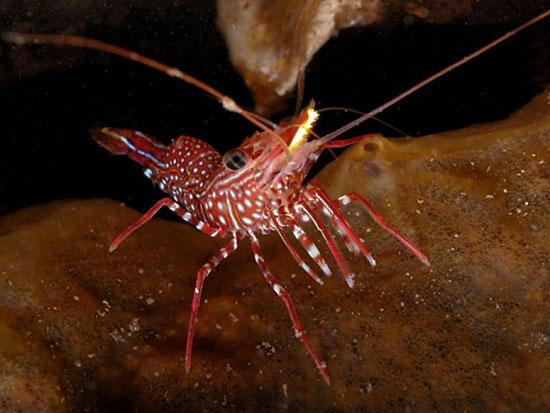681
The most noisy creature in the ocean - it is the shrimp

Noise "layer of shrimp" - the only one of all the natural noise that can "blind" the sonar submarine, stunning acoustics through the headphones.
Under the layer of shrimp, the hydrophone can not hear what is going on it, and vice versa. Heard from under a layer of prawns can be achieved in only one way: through him raise the mast.
The level of noise produced by the throng of shrimp, comes to deafening 246 decibels. Even given the fact that sound travels faster in water, it is equal to 160 dB in the air - is much louder than the noise at take-off jet (140 dB) and the pain threshold of human. Some observers have cited the following comparison: it is as if all the inhabitants of our planet at the same time took a griddle bacon.
The source of continuous noise are trillions of shrimp while snapping his only "oversized" claws. Clicking shrimp, representatives of various kinds of Alpheus and Synalpheus, found in shallow waters of the tropics and subtropics.
How all this is happening, even more interesting than how it sounds. For recording movies, are made with a frequency of 40 000 frames per second, it can be clearly seen that the sound is generated through 700 microseconds after it closes claw. It turns out that the noise does not produce a click claws, and the bursting of the bubble - an effect known to science as "cavitation».
How it looks? Small bump on one side of the claw enters the recess on the other side. Pincer closes so fast that it shoots out a trickle of water. The velocity of the water streams of up to 100 km / h - enough to form an expanding bubble of water vapor. When the water is slowed down and the pressure is normalized, the bubbles burst, producing a strong heat (up to 20, 000 ° C), a loud bang and the light - the latter is a fairly rare phenomenon called "sonoluminescence", ie when the sound generates light.
Shrimps use their noise to stun prey, as well as for communication and finding sexual partners. In addition to disabling the sonar, the sharp and intense sound leaves a dent in the propellers of ships.
S. Fry, «The Book of General Ignorance»
via factroom.ru
15 interesting and useful facts about chocolate
On the film "Spider-Man" costume was stolen 4 main character worth $ 50 thousand. Each























